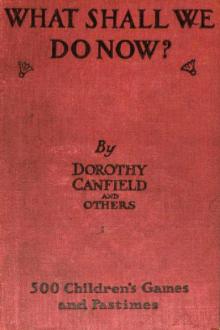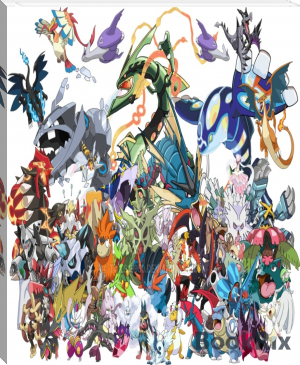What Shall We Do Now?, Dorothy Canfield Fisher [ebook offline reader .txt] 📗

- Author: Dorothy Canfield Fisher
- Performer: -
Book online «What Shall We Do Now?, Dorothy Canfield Fisher [ebook offline reader .txt] 📗». Author Dorothy Canfield Fisher
A river Tees
A doctor. Mr. Treves
A complaint Tic Doloreux
A play Timon of Athens
A state in the Union Tennessee
A musical instrument Trombone
A poet Tennyson
A flower Trefoil
A mineral Tin
A lake Tanganyika
A tree Tulip
A country Turkey
An author Trollope
An artist Tadema
A preacher Talmage
Each player in turn reads his list aloud, strikes off those words that others also have, and puts a mark against the rest. The specimen list here given is too simple to be called a good one. Players should reject the first thing that comes into their thoughts, in favor of something less natural.
Buried NamesThe first thing for the players to do is to decide what kind of name they will bury. The best way is to call out something in turn. Thus, if there are four players they may decide to bury the name of an author, a girl, a town, and a river. Each player writes these down and a fixed time is given for burial, which consists in writing a sentence that shall contain the name somewhere spelled rightly but spread over two words, or three if possible. At the end of the time the sentences are read aloud in turn, while the others guess. Of course, the whole game may be given up to burying only one kind of name, but variety is perhaps better. Examples are given:—
An author: I like to keep the yew in good order.
A girl: The boy was cruel, lazy and obstinate.
A town: Clothes that are new have no need of brushing.
A river: To see spoilt ham especially annoys me.
It is permissible to bury the name in the middle of one longer word, but it is better to spread it over two or three. Perhaps the best example of a buried English town is this: "The Queen of Sheba sings to keep her spirits up." This is good, because the sentence is natural, because of the unusual number of words that are made use of in the burial, and because in reading it aloud the sound of the buried town is not suggested.
Letters and TelegramsIn this game you begin with the Letter. The first thing to write is the address and "My dear ——," choosing whomever you like, but usually, as in "Consequences," either a public person or some one known, if possible, to every one present. The paper is then folded over and passed on. The next thing to write is the letter itself, which should be limited to two minutes or some short period, and should be the kind of letter that requires a reply. The paper is folded and passed on again, and the subscription, "Believe me yours sincerely," or whatever adverb you choose, and the signature are then added. (These may be divided into two separate writings if you like.) The signature should be that of another public person, or friend, relation or acquaintance of the family. The paper is then passed on once more, and a reply to the letter, in the form of a telegram, is written. That is to say, you must say as much as you can in ten words. Example:—
The Letter
The first player writes:—My dear Buffalo Bill.
The second player writes:—Can you give me any information about suitable songs for our village choir?
The third player writes:—Believe me yours slavishly.
The fourth player writes:—Kitchener of Khartoum.
The Reply Telegram
The fifth player writes:—Be with you to-morrow. Have sheets aired. Am bringing everything.
TelegramsThere is also the game of "Telegrams." In this the first thing to write is the name of the person sending the telegram. The paper is then passed on, and the name of the person to whom it is sent is written. The papers are then passed on again and opened, and the players in turn each say a letter of the alphabet, chosen at random, until there are ten. As these are spoken, each player writes them on the paper before him, leaving a space after it; so that when the ten are all written down his paper may look like this:
—
From the Duke of York
To Barnum and Bailey.
H ... A ... P ... N ...
W ... E ... K ... S ... F ...
T ...
A period of five minutes or more is then allowed in which to complete the telegram, the message having to be ten words long, and each word to begin, in the same order, with these letters. The players should, as far as possible, make the telegrams reasonable, if not possible. Thus, the form given above might, when finished, read like this:—
From the Duke of York
To Barnum and Bailey.
Have Awning Prepared Next
Wednesday Evening Kindly Send Five
Tickets
In calling out the ten letters which are to be used in the telegram, it is well to avoid the unusual consonants and to have a vowel here and there.
An amusing variety is for all the players to compose telegrams on the same subject; the subject being given beforehand. Thus it might be decided that all the telegrams should be sent from President Roosevelt to Alice in Wonderland asking for her views on the tariff. Then having completed these messages, the answers may also be prepared, using the same letters. But, of course, as in all games, family matters work out more amusingly than public ones.
InitialsPaper is handed round, and each player thinks of some public person, or friend or acquaintance of the company, and writes in full his or her Christian name (or names) and surname. Then, for, say, five minutes, a character sketch of the person chosen has to be composed, each word of which begins with the initial letter of each of the person's names, repeated in their right order until the supply of thought gives out or time is up. Thus, suppose the person chosen is Frank Richard Stockton, the story writer. The character sketch might run:—
F ancifully R ecounts S trange F reakish R omantic S tories. F inds
R isibility S urely. F requently R aises S miles.
An occasional "and" and "of" may be dropped in if necessary. Where one of the names begins with a vowel (such as William Ewart Gladstone) the character sketch can be made to run more easily.
It is sometimes more amusing to give every one the same names to work on; and in some houses the players are not allowed to choose names for themselves, but must pass the paper on. The characters of towns and nations may be written in the same way, using all the letters of the word as the initials.
RiddlesA more difficult game is "Riddles." At the top of the paper is written anything that you can think of: "A soldier," "A new dress," "A fit of the blues," "A railway accident"—anything that suggests itself. The paper is passed on and anything else is written, no matter what. It is passed on again and opened. Suppose that the two things written on it are, first, "A school-teacher," and second, "A pair of skates." The duty of the player is to treat them as a riddle, and, asking the question either as "Why is a school-teacher like a pair of skates?" or "What is the difference between a school-teacher and a pair of skates?" (whichever way one prefers), to supply a reasonable answer. This game, it will be seen, is suited particularly to clever people.
Rhymed RepliesThis is a game that needs a certain amount of readiness and some skill with words. Each of the party writes at the top of a piece of paper a question of any kind whatever, such as "How old was Cæsar when he died?" or "What is your favorite color?" The paper is folded over and passed on, and the next player writes a word—any word—such as "electricity," "potato," "courageously," "milk." The papers are then passed on once more and opened, and the task of each player is to write a rhyme in which the question on his paper is answered and the word on his paper is introduced.
Missing InformationEvery one is supplied with a piece of paper and pencils and tries to write down correct answers to questions about everyday things which we none of us know. A suggestive list is given but any one can add to it indefinitely.
1. How big do you think a postage-stamp is, in inches—a five dollar bill?
2. Draw a picture of a clock's face with the hands pointing to five minutes of twelve.
3. How tall do you think a man's silk hat is, a derby?
4. Draw the design in panels of the door to the room you are in. (Of course without looking at it.)
5. How many holes are there in a high laced shoe—your own?
6. How many toes has a cat, a dog?
7. How many legs has a fly?
8. How does a cow lie down? A horse?
9. About how many petals has a common daisy? A wild rose? A sun flower?
10. How high from the ground is a street-car?—a railway car?
The person who can answer most correctly the greatest number of questions is the winner.
Consequences"Consequences" is always a favorite game when a party has reached its frivolous mood. The method of playing is this: Sheets of paper and pencils are handed round, and every one writes at the head (1) an adjective suitable to be applied to a man, such as "Handsome." This word is then folded over so that it cannot be read, and each paper is passed on to the next person. The name of a man (2) is then written, either some one you know, or a public person, such as the president or Mr. Carnegie. This in turn is folded over and the papers are passed on. The word "met" is understood to be inserted at this point. That is to say, the completed story will tell how Handsome Mr. Carnegie met some one. The next thing (3) is to put down an adjective suitable to apply to the woman whom he met, such as "Buxom," and then (4) the woman's name, again either some one you know, or a public person,—the papers being folded and passed on after every writing. The remaining items are these:—(5) The place where they met—say, on the pier. (6) What he said to her—say, "I hope your neuralgia is better." (7) What she said to him—say, "There's nothing like rain for the crops." (8) What the consequence was—say, "They were married." (9) What the world said—"All's well that ends well."
It must be remembered that unless there are very few players, when it is less fun, you do not get the chance of writing more than once, or at most twice, on the same sheet of paper, so that it is of no use to have a reasonable series of remarks in your mind. The specimen given above is an average one. In print nothing could be much less funny, but when the company has the spirit of "Consequences," even so tame a story as this might keep the room merry. The game is always full of the unexpected, and the people who meet each other are almost sure to be laughing-stocks. The results are often better if all the papers are handed to one player to read.
Consequences ExtendedThe form of "Consequences" above given is the ordinary one and the simplest. But in





Comments (0)